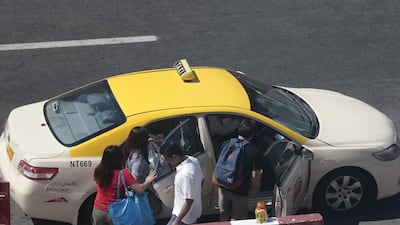ABU DHABI // Back-seat passengers are being encouraged to wear seat belts in a bid to reduce the number of fatalities on the roads.
Research carried out by Road Safety UAE and a cab booking service revealed that although 98 per cent of front-seat passengers buckle up only 57 per cent of those in the back follow suit.
Indeed, the cab booking service, Careem, has gone as far as to give permission to its drivers to refuse to accept back-seat passengers who do not wear a seat belt.
Education and legislation should be at the heart of action taken, said the head of the British consultancy Transport Research Laboratory.
“We need to invest into further education but also really need to push to get the legislation in place for seat belts in the rear to ensure that the targeted enforcement can also be undertaken,” said Dr Britta Lang. “Early road-safety education is also important.”
It is only law for front-seat passengers to buckle up. However, there have been ongoing calls for child seats to be made compulsory and back-seat passengers to belt up.
“The UAE authorities are working to implement the holistic seat-belt law, including back-seat passengers and children,” said Thomas Edelmann, founder of Road Safety UAE. “This is the most ‘low-lying fruit’ to achieve the objectives of the UAE Vision 2021. In the interim, we need to push the awareness and education levels of the country’s motorists and passengers to use the seat belt always.”
“It’s alarming,” Mr Edelmann added. “Accidents do happen and the single most effective device to avoid injury and fatalities is the seat belt.”
Careem declared last month the month of passenger safety, and urged its drivers to refuse to take passengers who fail to buckle up.
The company also asked customers to formally pledge to wear seat belts and become advocates for road safety. In return, pledgers will be rewarded with a 25 per cent discount on their next five Careem rides.
“In short, if you don’t buckle up, we will choose not to provide an unsafe trip,” said Christian Eid, Careem’s general manager. “Although this might sound drastic, we hope our passengers will value their safety as much as we do and hope that our community will welcome this bold move.”
Salaheddine Bendak, an associate professor at the University of Sharjah, said Careem’s message was a step in the right direction and it should be followed by other companies.
“There is a shortage of television ads, billboards and radio messages in the UAE on the importance of seat belts,” he said. “What currently exists is less than 10 per cent of what we can find in western countries, who achieved high seat-belt-use rates and safer roads.”
Dr Lang said there had been some interesting studies on the reasons why back-seat passengers did not wear seat belts.
“Some of these reasons seem to revolve around social norms and a misconception of the severity collisions can have,” she said. “An overwhelming body of evidence suggests that seat belts are one of the most effective measures to keep vehicle occupants safe, wherever they sit.”
rruiz@thenational.ae

